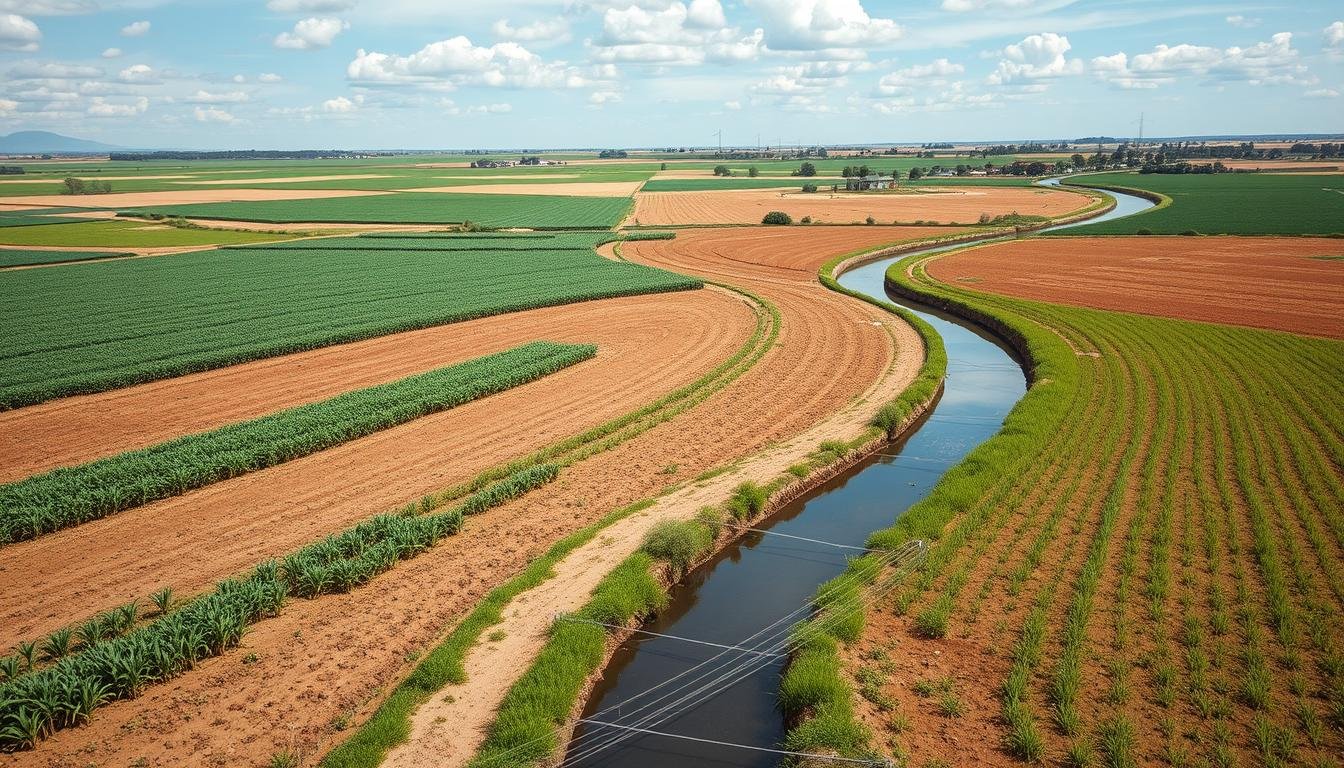Introduction
Imagine walking onto a beautiful family farm. Here, free-range chickens enjoy the sun and eat plants, seeds, berries, and bugs. Lindgren Family Farm in Benzonia, Michigan, is like this. They have hens like Barred Rocks, Buff Orpingtons, and Americanas living in a healthy, ethical place.
The eggs from these chickens show the farm’s dedication to quality and care for the environment. They cost $5.00 per dozen. These eggs come in many colors, like white, brown, blue, green, and pink. This is because of the different breeds.
These eggs are much better than what you find in stores. They are usually laid just before you buy them. This means they stay fresh longer and taste better.
Key Takeaways
- Free-range chickens at Lindgren Family Farm enjoy a natural, sustainable lifestyle, producing diverse, high-quality eggs.
- Farm-fresh eggs from Loudoun farms offer a longer shelf life and superior nutritional value compared to mass-produced grocery store eggs.
- Local farms in Loudoun County, such as A Dozen Eggs LLC and Ayrshire Farm, specialize in offering free-range chicken eggs and other organic products.
- Sustainable farming practices at Lindgren Family Farm ensure the land remains productive for future generations, with hens fed wholesome, antibiotic-free grain.
- Consumers can support ethical, environmentally-conscious farming by choosing farm-fresh free-range eggs from local family farms.
Understanding Free-Range Chicken Eggs
Free-range chicken eggs are known for their freshness and flavor. Hens that lay these eggs roam freely in open pastures. They engage in natural behaviors like scratching and socializing.
Unlike eggs from caged hens, free-range eggs are better for you. They also come from farms that care about the chickens’ well-being.
What Makes Eggs Truly Free-Range
True free-range eggs come from hens that can go outside anytime. These “happy hens” live under the sky, eating a variety of foods. This natural diet makes their eggs taste better and be more nutritious.
The Natural Lifestyle of Free-Range Hens
- Perching on elevated structures for comfort and security
- Dust bathing to maintain their feathers and keep pests at bay
- Scratching the ground to uncover seeds, bugs, and other natural food sources
- Pasturing in open fields, basking in the sun, and socializing with their flock
Differences from Conventional Eggs
Free-range eggs are different from regular eggs in many ways. They have more vitamins, minerals, and healthy fats like omega-3s. Free-range hens also live better lives, without the stress of small cages.
Superior Nutritional Benefits of Pastured Eggs
Eggs from free-range, pasture-raised chickens are packed with nutrients. They offer health benefits that regular eggs can’t match.
Research shows pastured eggs have up to 3 times more vitamin D than eggs from supermarkets. A study in the Food Chemistry journal found free-range egg yolks have 30% more vitamin D than caged hens’ yolks. Vitamin D is key for strong bones, a healthy immune system, and overall well-being.
Pastured eggs also have less cholesterol and saturated fat. They have up to 7 times more beta carotene than eggs from caged hens. Plus, they have 2/3 more vitamin A and up to three times more vitamin E. These nutrients are vital for good vision, skin health, and fighting off free radicals.
Moreover, eggs from pasture-raised hens are full of omega-3 fatty acids. A study revealed these eggs have twice as much vitamin E and long-chain omega-3 fats as eggs from caged hens. They have 2.5 times more total omega-3 fatty acids and a better omega-6 to omega-3 ratio.
Choosing pasture-raised, nutrient-dense eggs is a smart health choice for you and your family. These eggs offer exceptional taste and unmatched health benefits. Investing in high-quality, ethically produced eggs is a wise decision.
| Nutrient | Pastured Eggs | Conventional Eggs |
|---|---|---|
| Vitamin D | 30% more | Reference |
| Cholesterol | 1/3 less | Reference |
| Saturated Fat | 1/4 less | Reference |
| Beta Carotene | 7 times more | Reference |
| Vitamin A | 2/3 more | Reference |
| Vitamin E | 3 times more | Reference |
| Omega-3 Fatty Acids | 2.5 times more | Reference |
| Omega-6 to Omega-3 Ratio | Less than half | Reference |
The Free Range Difference: From Farm to Table
Free-range chicken farming offers a big difference from traditional egg production. Hens roam freely, foraging for plants, seeds, berries, and bugs. This lifestyle makes their eggs taste better and be of higher quality.
Natural Foraging Behaviors
Free-range chickens can show their natural foraging skills. They roam freely, unlike chickens in cages. This lets them find nutritious food, making their eggs truly special.
Sustainable Farming Practices
Free-range chicken farming focuses on sustainable agriculture. Hens eat a healthy diet without antibiotics or animal by-products. This approach helps the environment and supports local farmers.
Ethical Treatment of Hens
Hens’ well-being is key in free-range farming. They have cozy coops for sleep and open spaces for the day. This ensures they are happy and healthy, producing nutritious eggs that reflect humane farming and sustainable agriculture.
Health Benefits of Free-Range Chicken Eggs
Free-range chicken eggs offer many health benefits over regular eggs. They are free from antibiotics, non-GMO, and fed a vegetarian diet. This makes them a better choice for your health.
These eggs have more vitamins and minerals than regular eggs. They have more vitamins A, D, and E. They also have more omega-3 fatty acids, which are good for your heart and brain.
Free-range eggs have less cholesterol and saturated fat. This makes them a healthier option for your heart.
| Nutrient | Free Range Eggs | Conventional Eggs |
|---|---|---|
| Protein | 6 g | 6 g |
| Omega-3 Fatty Acids | 70 mg | 30 mg |
| Vitamin D | 3-6 times more | Less |
| Cholesterol | 277 mg | 423 mg |
| Calories | 72 | 72 |
Free-range eggs are also full of choline. Choline helps with memory and nerve function. They also have vitamins A, D, and E, which are good for your overall health.

Choosing free-range eggs means you get a healthier and more sustainable food choice. These eggs are a great part of a balanced diet.
Sustainable Farming Practices on Family Farms
Family farms in Connecticut see their land as a valuable resource. They use sustainable farming to keep their land good for future generations. They care for hens, use grain without antibiotics, and support local farming.
By doing this, they help the environment and make their communities stronger.
Environmental Impact
Family farms and sustainable farming help the environment. For example, free-range egg farms have little impact if managed well. They trade chicken manure for feed, keeping the soil healthy.
Supporting Local Agriculture
Family farms are key to local agriculture. They use sustainable methods to keep their land good for farmers to come. This helps the local food system, benefiting everyone.
Preserving Farmland for Future Generations
Family farms sustainable farming is vital for keeping land for the future. Practices like regenerative agriculture improve soil and productivity. This keeps the land fertile for local food production for years.
Natural Diet and Feed Quality
Free-range chicken eggs get their quality from the chicken’s diet. These chickens eat plants, seeds, berries, and insects they find on the farm. Farms also give them high-quality, vegetarian feed, often with oats and molasses.
In Connecticut, some farms use organic feed that’s corn-free and soy-free. They get this feed from New Country Organics. This natural, antibiotic-free diet makes their eggs healthier and more nutrient-dense.
Having clean, well water is key for better eggs. This care and feeding make the eggs fresher, tastier, and full of good stuff like vitamins and healthy fats.
| Nutrient | Free-Range Eggs | Conventional Eggs |
|---|---|---|
| Cholesterol | 25-33% less | Higher |
| Saturated Fat | 25% less | Higher |
| Vitamin A | 3 times more | Lower |
| Vitamin E | 2 times more | Lower |
| Omega-3 Fatty Acids | 2 times more | Lower |
| Vitamin D | 6 times more | Lower |
Free-range egg producers focus on a natural chicken feed and an organic and vegetarian diet. This makes their eggs better for you and the planet.

Comparing Free Range vs. Conventional Egg Production
Egg production has two main methods: free range and conventional. Free-range eggs come from hens that roam freely. They forage naturally, unlike hens in battery cages used in conventional farming.
Production Methods
Free-range egg production focuses on the hens’ natural lifestyle. Chickens can go outside to dust-bathe, perch, and explore. In contrast, conventional farming keeps hens in small cages, limiting their movement and natural behaviors.
Quality Standards
Free-range eggs meet higher quality standards than conventional eggs. Hens are fed organic, pesticide-free diets. This makes their eggs richer in vitamins, minerals, and omega-3 fatty acids.
Cost Differences
| Egg Type | Price per Dozen |
|---|---|
| Store-brand battery-cage large white eggs | $2.85 |
| Store-brand battery-cage brown eggs | $2.79 |
| Cage-free white eggs | $3.29 |
| Free-range white eggs | $4.49 |
Free-range eggs cost more due to higher production costs and better quality. For example, Lindgren Family Farm’s free-range eggs are $5.00 per dozen. Some Connecticut farms charge up to $7.50 per dozen for their free-range eggs.
Supporting Small Family Farms
Choosing free-range chicken eggs means more than just getting a great product. It also supports local agriculture’s heart: small family farms. These farms, like the one in Connecticut, are often family affairs. They involve generations working together to raise hens and sell them to the community.
By backing these local farms, you get the freshest, most nutritious eggs. You also help keep your region’s farming heritage alive. These farms teach kids about responsibility, sustainability, and the value of knowing where food comes from.
Small family farms treat their hens better than big factory farms do. The chickens roam, forage, and act naturally. This results in eggs that are truly free-range. Buying from a local farm means your eggs were made with care and a focus on sustainable farming.
Buying from local farms also boosts your community’s economy. These small businesses put their profits back into the area. They support other farms, businesses, and families. Your egg purchase helps your community thrive and keeps its agricultural roots alive.
So, when you want the best eggs, visit a backyard chicken or poultry farm for sale. Supporting these small, family-owned local chicken farms gives you great eggs. It also helps keep your local food system strong and preserves your region’s farming heritage.
Vitamin and Mineral Content Analysis
Free-range chicken eggs are packed with nutrients, unlike regular eggs. They have more vitamins and minerals, making them a better choice for your family.
Enhanced Vitamin D Levels
Free-range eggs have a lot of vitamin D. They have up to 3-6 times more than regular eggs. This means you get a big boost of vitamin D from them.
Omega-3 Fatty Acids
Free-range chickens eat better, which makes their eggs richer in omega-3s. These fats are good for your heart and brain. Free-range eggs have up to three times more omega-3s than regular eggs.
Superior Protein Quality
The protein in free-range eggs is top-notch. Hens eat a variety of foods, making their eggs’ protein better. Studies show no big difference in protein between free-range and regular eggs.
Eating these nutritious eggs can improve your diet and health. Free-range eggs are a great choice for anyone looking to eat healthier.
Humane Farming Practices
When it comes to ethical eggs, cruelty-free eggs, and happy hens, humane farming is key. Free-range hens can do natural things like dust bathing and socializing. They get fresh air and sunlight, which is good for them.
Family farms like Blue Sky Family Farms focus on hen welfare. They let hens be themselves, which makes them healthier. This also means better eggs for us.
They don’t use antibiotics or hormones. This is because naturally raised chickens are usually healthier.
| Conventional Egg Production | Humane Egg Production |
|---|---|
|
|
Family farms like Blue Sky Family Farms care about their chickens. This means we get better, ethical eggs. Their focus on humane farming makes sure our eggs are not only good but also healthy.

Seasonal Variations in Free-Range Egg Production
Egg production from free-range chickens changes with the seasons. This is due to daylight hours and temperature shifts. Family farms see egg numbers vary, from 10-20 dozen a day in slow periods to 20-40 dozen in busy times.
Seasonal changes affect more than just how many eggs are laid. Egg size, shell quality, and how often hens lay eggs can also change. Farmers adjust their ways to keep the egg supply steady while letting hens follow their natural instincts.
Understanding Egg Laying Cycles
Free-range chickens start laying eggs at 18-22 weeks old. They reach their peak of about 90% laying within 6-8 weeks. After a year, they lay about 65% of the time. Some hens keep laying for 50-60 weeks before they molt.
What hens eat is key to egg production. Not enough energy, protein, calcium, or amino acids like methionine can lower egg numbers and shell quality. Farmers must balance the hens’ diets for the best egg-laying.
Seasonal Impacts on Egg Production
- Increased temperatures can reduce egg production by up to 10%
- Artificial lighting can boost production by 20-30% in open-air facilities
- Mortality rates vary, with the highest during the grower stage (8-20 weeks)
- The ideal body weight for laying hens is around 1.5 kg
- Exposure to toxins, pesticides, or spoiled feed can dramatically impact egg quality and output
By knowing their hens’ natural cycles and dietary needs, farmers can keep the egg supply steady all year. This ensures fresh, high-quality eggs for everyone.
Choosing and Storing Farm Fresh Eggs
When picking farm-fresh eggs, look for clean, uncracked shells. The yolk color of free-range eggs is often darker. This is because hens eat more foods rich in beta-carotene while foraging. This vibrant color shows the eggs are full of nutrients and fresh.
Quality Indicators
To get the best farm fresh eggs, check for these signs:
- Clean, uncracked shells
- Bright, deep-colored yolks
- Firm, properly structured whites
- No off-odors or discoloration
Storage Tips
For the best egg quality and freshness, keep them chilled. Use farm-fresh eggs within 3-5 weeks. Some farms in Connecticut let customers buy fresh eggs directly.
Shelf Life Guidelines
Unwashed eggs can last two weeks at room temperature and over three months in the fridge. Washed eggs need to be refrigerated and last about two months. Storing and handling them right keeps their nutritional value and tastes great.
| Egg Storage | Shelf Life |
|---|---|
| Unwashed eggs (room temperature) | 2 weeks |
| Unwashed eggs (refrigerated) | 3+ months |
| Washed eggs (refrigerated) | 2 months |
Conclusion
Free-range chicken eggs from family farms are a great choice. They are full of good nutrients, have less cholesterol, and are made kindly. By picking these eggs, you get a healthier, tastier option. You also help your community and the planet.
These farms care a lot about the hens and the earth. This means their eggs are good for you and the planet. Buying free-range eggs helps small farms, saves the environment, and treats hens right. It’s a small step that makes a big difference.
Choosing free-range chicken eggs is a smart move. They’re packed with nutrients and help local farms and the environment. These eggs are a tasty, responsible choice that fits your values and supports family farming.
What makes eggs truly free-range?
Eggs from truly free-range hens let them roam outside freely. They can socialize, forage, dust bathe, and scratch.
How do the nutritional profiles of free-range and conventional eggs differ?
Free-range eggs have more vitamins D, A, and E. They also have less cholesterol and saturated fat. Plus, they have more beta-carotene and omega-3 fatty acids than conventional eggs.
What kind of natural diet do free-range chickens have?
Free-range chickens eat plants, seeds, berries, and bugs. They also get high-quality, vegetarian feed without antibiotics or animal by-products.
How do free-range farming practices differ from conventional methods?
Free-range farming lets hens roam freely. It focuses on natural behaviors and diets. This is different from battery cages used in conventional farming.
What are the health benefits of choosing free-range eggs?
Free-range eggs are more nutritious. They have more vitamins, minerals, and omega-3s. They also have less cholesterol and saturated fat than conventional eggs.
How do free-range farms support sustainable agriculture and local economies?
Family farms with free-range chickens use sustainable farming. They sell directly to consumers, supporting local economies and building community ties.
How can I identify and store high-quality free-range eggs?
Choose eggs with clean, uncracked shells and darker yolks. Store them in the fridge for 3-5 weeks to keep them fresh
Source Links
- Loudoun Farms: Eggs
- Eater: What’s the Difference Between Free-Range, Cage-Free, and Pasture-Raised Eggs?
- Medical News Today: What are the differences between cage-free, free-range, and pasture-raised eggs?
- Grassland Beef: Free-Range vs. Pasture-Raised: Which Eggs Are Best?
- Food & Agriculture Organisation (FAO): Egg Production
- Delish: 6 Reasons You Should Be Buying Free-Range Eggs
- Penn State (Agriculture Sciences): Research shows eggs from pastured chickens may be more nutritious
- The Humane Society of the United States: Cage-free vs. battery-cage eggs






